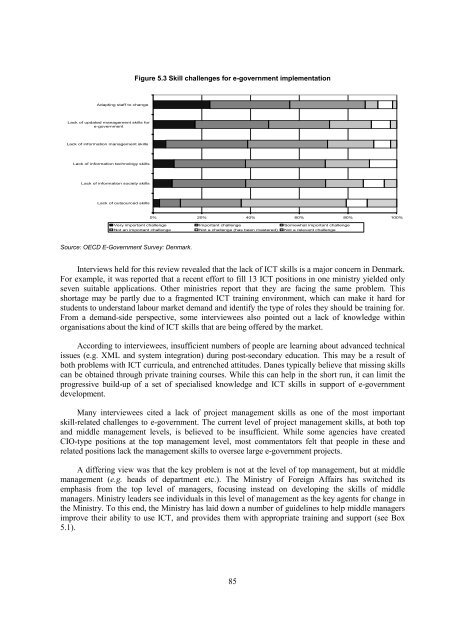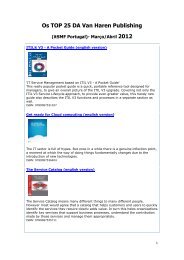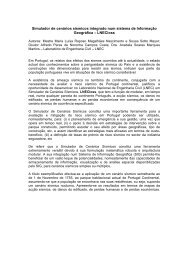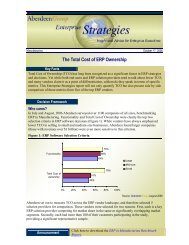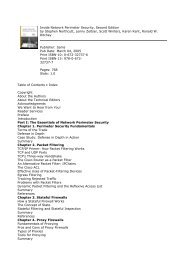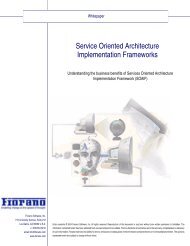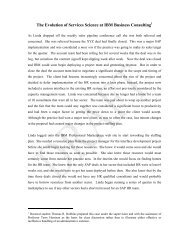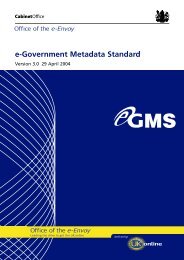OECD Peer Review of E-Government in Denmark - ePractice.eu
OECD Peer Review of E-Government in Denmark - ePractice.eu
OECD Peer Review of E-Government in Denmark - ePractice.eu
Create successful ePaper yourself
Turn your PDF publications into a flip-book with our unique Google optimized e-Paper software.
Figure 5.3 Skill challenges for e-government implementation<br />
Adapt<strong>in</strong>g staff to change<br />
Lack <strong>of</strong> updated management skills for<br />
e-government<br />
Lack <strong>of</strong> <strong>in</strong>formation management skills<br />
Lack <strong>of</strong> <strong>in</strong>formation technology skills<br />
Lack <strong>of</strong> <strong>in</strong>formation society skills<br />
Lack <strong>of</strong> outsourced skills<br />
0% 20% 40% 60% 80% 100%<br />
Very important challenge Important challenge Somewhat important challenge<br />
Not an important challenge Not a challenge (has been mastered) Not a relevant challenge<br />
Source: <strong>OECD</strong> E-<strong>Government</strong> Survey: <strong>Denmark</strong>.<br />
Interviews held for this review revealed that the lack <strong>of</strong> ICT skills is a major concern <strong>in</strong> <strong>Denmark</strong>.<br />
For example, it was reported that a recent effort to fill 13 ICT positions <strong>in</strong> one m<strong>in</strong>istry yielded only<br />
seven suitable applications. Other m<strong>in</strong>istries report that they are fac<strong>in</strong>g the same problem. This<br />
shortage may be partly due to a fragmented ICT tra<strong>in</strong><strong>in</strong>g environment, which can make it hard for<br />
students to understand labour market demand and identify the type <strong>of</strong> roles they should be tra<strong>in</strong><strong>in</strong>g for.<br />
From a demand-side perspective, some <strong>in</strong>terviewees also po<strong>in</strong>ted out a lack <strong>of</strong> knowledge with<strong>in</strong><br />
organisations about the k<strong>in</strong>d <strong>of</strong> ICT skills that are be<strong>in</strong>g <strong>of</strong>fered by the market.<br />
Accord<strong>in</strong>g to <strong>in</strong>terviewees, <strong>in</strong>sufficient numbers <strong>of</strong> people are learn<strong>in</strong>g about advanced technical<br />
issues (e.g. XML and system <strong>in</strong>tegration) dur<strong>in</strong>g post-secondary education. This may be a result <strong>of</strong><br />
both problems with ICT curricula, and entrenched attitudes. Danes typically believe that miss<strong>in</strong>g skills<br />
can be obta<strong>in</strong>ed through private tra<strong>in</strong><strong>in</strong>g courses. While this can help <strong>in</strong> the short run, it can limit the<br />
progressive build-up <strong>of</strong> a set <strong>of</strong> specialised knowledge and ICT skills <strong>in</strong> support <strong>of</strong> e-government<br />
development.<br />
Many <strong>in</strong>terviewees cited a lack <strong>of</strong> project management skills as one <strong>of</strong> the most important<br />
skill-related challenges to e-government. The current level <strong>of</strong> project management skills, at both top<br />
and middle management levels, is believed to be <strong>in</strong>sufficient. While some agencies have created<br />
CIO-type positions at the top management level, most commentators felt that people <strong>in</strong> these and<br />
related positions lack the management skills to oversee large e-government projects.<br />
A differ<strong>in</strong>g view was that the key problem is not at the level <strong>of</strong> top management, but at middle<br />
management (e.g. heads <strong>of</strong> department etc.). The M<strong>in</strong>istry <strong>of</strong> Foreign Affairs has switched its<br />
emphasis from the top level <strong>of</strong> managers, focus<strong>in</strong>g <strong>in</strong>stead on develop<strong>in</strong>g the skills <strong>of</strong> middle<br />
managers. M<strong>in</strong>istry leaders see <strong>in</strong>dividuals <strong>in</strong> this level <strong>of</strong> management as the key agents for change <strong>in</strong><br />
the M<strong>in</strong>istry. To this end, the M<strong>in</strong>istry has laid down a number <strong>of</strong> guidel<strong>in</strong>es to help middle managers<br />
improve their ability to use ICT, and provides them with appropriate tra<strong>in</strong><strong>in</strong>g and support (see Box<br />
5.1).<br />
85


